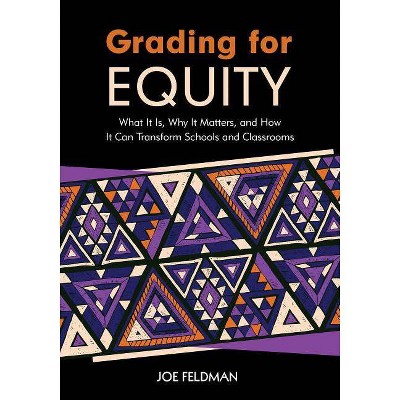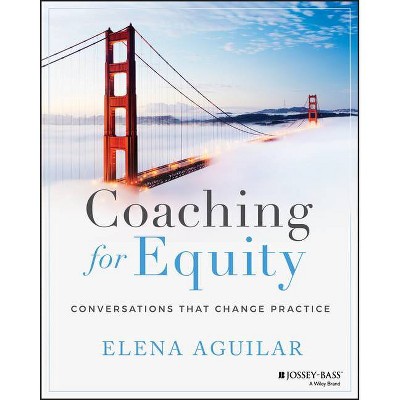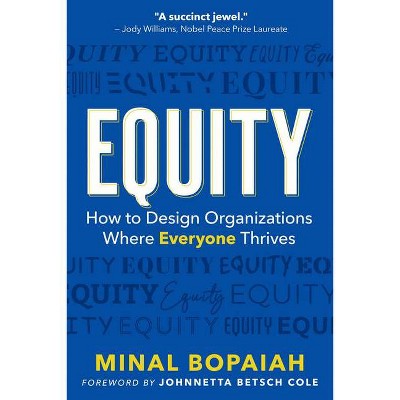Grading for Equity - by Joe Feldman (Paperback)

Similar Products
Products of same category from the store
AllProduct info
<p/><br></br><p><b> About the Book </b></p></br></br><p><strong><em>Joe Feldman shows us how we can use grading to help students become the leaders of their own learning and lift the veil on how to succeed. . . . This must-have book will help teachers learn to implement improved, equity-focused grading for impact.</em></strong></p> <strong>--Zaretta Hammond, </strong></p> <strong>Author of <em>Culturally Responsive Teaching & The Brain</em></strong></p> <p><strong><em>Crack open the grading conversation</em></strong></p> <p>Here at last--and none too soon--is a resource that delivers the research base, tools, and courage to tackle one of the most challenging and emotionally charged conversations in today's schools: our inconsistent grading practices and the ways they can inadvertently perpetuate the achievement and opportunity gaps among our students.</p> <p>With <em>Grading for Equity, </em> Joe Feldman cuts to the core of the conversation, revealing how grading practices that are accurate, bias-resistant, and motivational will improve learning, minimize grade inflation, reduce failure rates, and become a lever for creating stronger teacher-student relationships and more caring classrooms. Essential reading for schoolwide and individual book study or for student advocates, <em>Grading for Equity</em> provides</p> <ul> A critical historical backdrop, describing how our inherited system of grading was originally set up as a sorting mechanism to provide or deny opportunity, control students, and endorse a fixed mindset about students' academic potential--practices that are still in place a century later</li> </ul> <ul> A summary of the research on motivation and equitable teaching and learning, establishing a rock-solid foundation and a true north orientation toward equitable grading practices</li> Specific grading practices that are more equitable, along with teacher examples, strategies to solve common hiccups and concerns, and evidence of effectiveness</li> Reflection tools for facilitating individual or group engagement and understanding</li> </ul> <p>As Joe writes, Grading practices are a mirror not just for students, but for us as their teachers. Each one of us should start by asking, What do my grading practices say about who I am and what I believe? Then, let's make the choice to do things differently . . . with <em>Grading for Equity</em> as a dog-eared reference.</p> <p> </p> <p> </p> <p> </p> <p> </p> <p> </p><p/><br></br><p><b> Book Synopsis </b></p></br></br><p><strong><em>Joe Feldman shows us how we can use grading to help students become the leaders of their own learning and lift the veil on how to succeed. . . . This must-have book will help teachers learn to implement improved, equity-focused grading for impact.</em></strong></p> <strong>--Zaretta Hammond, </strong></p> <strong>Author of <em>Culturally Responsive Teaching & The Brain</em></strong></p> <p><strong><em>Crack open the grading conversation</em></strong></p> <p>Here at last--and none too soon--is a resource that delivers the research base, tools, and courage to tackle one of the most challenging and emotionally charged conversations in today's schools: our inconsistent grading practices and the ways they can inadvertently perpetuate the achievement and opportunity gaps among our students.</p> <p>With <em>Grading for Equity, </em> Joe Feldman cuts to the core of the conversation, revealing how grading practices that are accurate, bias-resistant, and motivational will improve learning, minimize grade inflation, reduce failure rates, and become a lever for creating stronger teacher-student relationships and more caring classrooms. Essential reading for schoolwide and individual book study or for student advocates, <em>Grading for Equity</em> provides</p> <ul> A critical historical backdrop, describing how our inherited system of grading was originally set up as a sorting mechanism to provide or deny opportunity, control students, and endorse a fixed mindset about students' academic potential--practices that are still in place a century later</li> </ul> <ul> A summary of the research on motivation and equitable teaching and learning, establishing a rock-solid foundation and a true north orientation toward equitable grading practices</li> Specific grading practices that are more equitable, along with teacher examples, strategies to solve common hiccups and concerns, and evidence of effectiveness</li> Reflection tools for facilitating individual or group engagement and understanding</li> </ul> <p>As Joe writes, Grading practices are a mirror not just for students, but for us as their teachers. Each one of us should start by asking, What do my grading practices say about who I am and what I believe? Then, let's make the choice to do things differently . . . with <em>Grading for Equity</em> as a dog-eared reference.</p> <p> </p> <p> </p> <p> </p> <p> </p> <p> </p><p/><br></br><p><b> Review Quotes </b></p></br></br><br><em></em><em>There is growing awareness within the industry of education that traditional grading practices have become a barrier to meaningful student learning. One dilemma is that there is a lack of resources to support educators who want to adopt new grading practices that are both accurate and equitable. Joe Feldman addresses this need with his book, Grading for Equity. Joe skillfully makes a compelling argument for change and offers specific ways educators can make profound differences to their grading practices. Students become intrinsically motivated to learn when their grades accurately measure where they are in the learning process. Students who typically give up any hope of success can now approach learning with a positive growth mindset. </em> Grading for Equity<em> will provide clarity and tools for an individual instructor or as a book study for an entire organization.<br/> </em>--Jeffrey Tooker, Deputy Superintendent of Educational Services, Placer Union High School District (5/21/2018 12:00:00 AM)<br><br><em>Joe Feldman peels back the curtain and shows the many flaws of our traditional grading system. His arguments are convincing - and the alternatives he proposes are both practical and powerful. Reading this book will make you re-think the way you assess students and will inspire you to enact a system that encourages revision and redemption instead of compliance and corruption. </em>--Denise Pope, Senior Lecturer, Stanford Graduate School of Education, and Co-Founder, Challenge Success (6/1/2018 12:00:00 AM)<br><br><em>We don't usually think of grading when talking about equity, but in </em>Grading for Equity: What It Is, Why It Matters, and How It Can Transform Schools and Classrooms<em>, Joe Feldman helps us see why grading is an integral part of an equity agenda. He shows us how we can use grading to help students become the leaders of their own learning and lift the veil on how to succeed. He reminds us that authentic assessment and transparent grading are essential parts of a culturally responsive classroom. This must-have book will help teachers learn to implement improved, equity-focused grading for impact.</em></p>--Zaretta Hammond, Education Consultant and Author of Culturally Responsive Teaching and the Brain (6/19/2018 12:00:00 AM)<br><br><em>Wow, Wow Wow!!! This book hooked me as a not-to-be-missed read right from the Prologue. Joe Feldman makes a strong case for shared grading practices to overcome the inequity of traditional grading, with solid reasoning, well-chosen research evidence, and perhaps most significantly, the powerful and frequent use of teacher voice. The chapters' organizing structure encourages thoughtful and reflective reading, and will be particularly beneficial for book study within PLCs. . . . The main message of the book for me is summed up in this quote, ′We teachers cannot continue to sacrifice the integrity and reliability of our grades at the altar of professional autono</em><em>my.′</em><em><br/> </em><em><br/> </em>--Ken O′Connor, Author and Consultant, How to Grade for Learning (5/21/2018 12:00:00 AM)<br><br><p><em>This book will stop educators who want to improve their practices with underserved students right in their tracks. Feldman offers an insightful invitation to teachers who dare change the ways in which we have been taught to grade students' products. He demonstrates how our grading practices are grossly under-substantiated and too often unquestioned, and he challenges educators to build equitable assessment tools and mechanisms to support learning and development of all students. </em>Grading for Equity<em> penetrates macro-level grading policies to transform micro-level teaching practices that embrace the cultural and the contextual. A must read for justice-centered educators. </em></p> <br/>--Rich Milner, Co-Author of "′These Kids are Out of Control: ′ Why We Must Reimagine Classroom Management for Equity (5/8/2018 12:00:00 AM)<br>
Price History
Cheapest price in the interval: 34.95 on October 27, 2021
Most expensive price in the interval: 34.95 on November 6, 2021
Price Archive shows prices from various stores, lets you see history and find the cheapest. There is no actual sale on the website. For all support, inquiry and suggestion messagescommunication@pricearchive.us




















